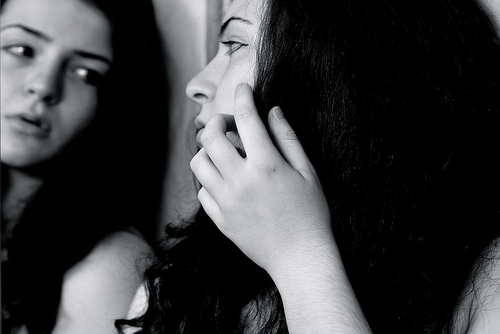My entire life, people have told me that I’m pretty.
But like Beyoncé says, “pretty hurts,” and it took me a long time to realize the impact of hearing well-intentioned, yet destructive, words.
For years, I’ve been told that I am cute, pretty, beautiful and lovely in terms of my physical appearance. And for years, good looks became my thing.
Beauty was the thing I could control. Being pretty meant attention. It meant feeling important and valuable. I learned rather quickly that being attractive led to more smiles, more opportunities, more positive assumptions about my intentions, more getting what I wanted. More, more, more.
I also realized this attention, rooted in appearance, opened space for manipulation, hollowness and miscommunication.
I started to notice that being beautiful often meant I could get away with behaving however I wanted, however poorly, which led to unhealthy power balance and a lack of integrity. Nobody ever thinks that the sweet, pretty girl will lie, right?
I started to feel incredibly insecure, always wondering if people liked me for myself. In relationships, I constantly stressed about being a “trophy” girlfriend — but I also desperately wanted to be that prize for someone — which resulted in a substantial fear of commitment. I worried that I would only be loved, known or accepted, as long as I was deemed attractive.
This concept dug its nails into my developing perfectionism, and boy, did it do a number on me.
The more compliments people paid me, the higher my self-esteem rose and the more emphasis I put on my appearance: being thin, wearing makeup, always smiling, perfectly kept hair, great style, white teeth. The media, as it does for all women, continued to hammer these thoughts into my brain, and I listened, taking all of it to heart.
Because I was pretty, I didn’t have to be brave.
I let my looks open all the doors, and settled for a lot less than I deserved. Beauty became something to be traded, used and micro-managed.
In college, things started to escalate. I still got good grades, but all of a sudden, classes became more challenging. I had a few part-time jobs, but student loans started to build up, causing great stress and anxiety. I gained the freshman 15. I swore I wouldn’t, which led to late night hours on the elliptical machine; because I ate so little during the day, I snuck fast food in the evenings and even (to my great shame) forced myself to throw up a few times to destroy the evidence.
Then I graduated, moved to Chicago for a new job downtown, went through three heart-wrenching break-ups in the span of three years and finished a full-time graduate program at a top university. I said yes, yes, yes to everything, until it all came crashing down.
When I ended my engagement, to my college boyfriend, I felt alone, for the first time, as if my security blanket had been ripped out from underneath me. I knew it was the right decision, but it didn’t make it easier and I threw myself into other relationships, work and school.
Mostly, I kept trying to be perfect and beautiful—because that’s what had always worked for me.
When the next guy informed me that he, “preferred girls who are almost anorexic, but not sick, just extremely skinny,” I stopped eating lunch. I didn’t need it, I reasoned, and besides, I was always rushing between class and work anyway. The pounds started to slip away, and I felt light as a feather — so light, in fact, that when the same boyfriend became controlling and obsessive about our relationship, the damage seemed miles away.
When another man I adored, who I thought I was dating, started secretly seeing a friend of mine, my heart filled with rage.
I was prettier than her! I thought. Why would he choose her? I wondered, filling the pages of my journal with frustration.
Even now, I can remember precisely that sick one-two punch of rejection, that powerful feeling of not being good enough.
When my graduate school professor gently noted that it didn’t seem like I wanted to pursue a PhD, I strode ahead, desperate to prove to others that I was not only pretty, but smart as well.
That’s the double-whammy, or so says our society.
It’s not enough to be just good-looking, you’ve got to be wildly intelligent, wealthy, thin, funny, successful, the whole shebang.
When my therapist asked if I ever thought about hurting myself, I paused before answering,”no, I would never ”— that’s when I knew something was wrong.
So, I cut out the toxic relationships. I stopped dating. I acknowledged that I was too thin and fairly depressed. I quit skipping meals. I let my family help me. I moved to a new city to take a new job. I stopped spending an hour getting ready for work each morning. I started to think hard about my own self-worth, my priorities, my values and my dreams.
I wondered how my heart and soul had drifted so far away from my body and mind.
It took three years to rid myself of the belief that being pretty mattered most. Three years of a healthy relationship (for once) and a stable environment led to new freedom to consider what actually filled me up and made me feel whole. Turns out, it wasn’t being beautiful or perfect.
For the first time in my life, I began to worry less about how I looked and focused more on how I felt.
Writing and yoga helped immensely. A stable environment and a healthy relationship also served as a salve. But it wasn’t until I picked up Yes Please by: Amy Poehler, that I finally found the words to talk about the experience of obsessing over appearance.
I assumed I would like her memoir — after all, I think Poehler is absolutely hilarious, and her comedy work continues to break down barriers for women everywhere. (Also, she and Tina Fey are just the absolute best together and I want them to host all award shows always).
But, Yes Please resonated with me in a major way due to one quote about deciding one’s currency. Poehler talks about not feeling pretty as a young girl, and how after a certain point, she decided that being funny would be her currency. Instead of trying to get people to think she was beautiful, she only wanted them to think she was hilarious. That became her goal, her career, her core sense of identity.
“Decide what your currency is early. Let go of what you will never have. People who do this are happier and sexier.” ~ Amy Poehler
I love this idea. For many years, I truly believed that being beautiful was my only currency. It led to a lot of physical, emotional and psychological damage, that took years to repair. The worst part? I still feel hesitation about sharing my experiences because I am embarrassed and ashamed. I feel like it was my fault—I shouldn’t have let it happen. I’m smart, and I’ve experienced no major trauma or tragedy, and I have a loving family and plenty of privilege.
In other words, I’m just like 1000s of women out there who don’t have a “reason” to experience disordered eating or depression, and yet, I did.
I’m thankful, because even though it was awful, it could have been worse. I managed to clean up my destructive eating behaviors without developing a more serious disorder—I was able to change my negative mental patterns, surrounding self-worth through yoga, church and friendships.
But, when I heard Poehler talk about deciding one’s currency, I remembered my years of struggle around external validation and appearance.
One of my strongest memories from childhood is hearing my mother say,
“Honey, you are so beautiful, but remember that beauty fades. It can always be taken away from you. You could get into an accident tomorrow or get sick and your beauty could disappear, at least in the way you know it. So, make sure you stay pretty on the inside for the long run.”
I didn’t know I had misunderstood her. She meant that beauty is enjoyable and fun, but not the most important trait. I thought she meant I should protect my beauty at all costs, because it is the most important thing about me. I was wrong.
I now know that beauty is a bonus. It’s nice to get a compliment about my appearance. It’s great and fine to want to look good, get in shape, lose weight or gain muscle. It’s fun to delight over a fantastic outfit and revel in a long run or hot yoga class.
Looks are no longer my currency. It pains me to remember how much time and energy I spent and wasted on believing otherwise.
I’m grateful to shift my mindset, but others remain locked into the idea that appearance matters most. “Thinspiration” and “pro-ana [anorexia]” abound, on social media sites.
24 million people in the U.S. suffer from an eating disorder and about 85–90 percent of them are women. Anorexia is the third most common chronic illness among adolescents, and over half of teenage girls participate in unhealthy eating behaviors without ever being diagnosed. 81 percent of 10-year-olds are afraid of being fat. 50% of people diagnosed with eating disorders experience depression to varying degrees and 70% of antidepressant prescriptions are given to women.
This emphasis on beauty, on appearance — it’s killing us. Literally.
This is why I support movements like #AskHerMore and Lisa Bloom’s work on talking to little girls about ideas rather than looks. This is why I continue to adore outspoken women in today’s media landscape who are making a difference and speaking loudly when it comes to portraying real, diverse women on screen. Hats off to Amy Poehler, Lena Dunham, Mindy Kaling, Shonda Rhimes, Tiny Fey and Amy Schumer — creatives who are challenging the lie that all women need to be thin, beautiful, white, polite and perfect.
This is why I appreciate the honesty of blogs like Choosing Raw and Momastery and many more.
What makes me feel happy and sexy nowadays is no longer a flat tummy, size zero jeans, curled lashes or the adoring gaze of strangers. All of that is temporary, anyway. Sometimes I forget that truth, but I always try to remember. And even on the days when I feel happy and sexy, I still have moments of feeling sad, or confused, angry, jealous, anxious or scared.
I don’t use my appearance to “fix” myself, as a distraction from feeling my full range of emotions as a human being.
I strive to be smart, kind, generous, thoughtful, creative, reliable, honest or funny, like Poehler. Now, if someone tells me I am beautiful, I say, “Thank you,” and carry on being my best, brightest self.
references:
American Psychological Association
Anorexia Nervosa and Associated Disorders
~
Relephant:
The Unbelievable Power of Makeup.
Author: Julia Hogren
Editor: Ashleigh Hitchcock
Photo: flickr


 Share on bsky
Share on bsky





Read 0 comments and reply